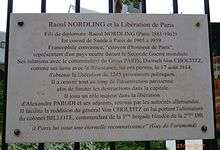Raoul Nordling

(free translation) Raoul Nordling and the Liberation of Paris. Nordling was a diplomat serving as consul of Sweden in Paris from 1905 to 1959. He was a convinced Francophile, a citizen of Paris, he represented a neutral country, Sweden, during World War II. His relations with the commander of Greater Paris, Dietrich von Choltitz, and his links with the resistance, helped him, on August 17, 1944, to obtain the release of political prisoners. He worked throughout the Paris insurrection in order to limit the destruction in the capital. He played a major role in the liberation of Alexander Parodi, and his assistants, who had been detained by the German authorities. He facilitated the surrender of General Choltitz, giving him the ultimatum of Colonel Billote, commander of the 1st brigade of the 2nd armored division.
“And Paris owes him eternal gratitude.” (Guy de Faramond)
Raoul Nordling (French pronunciation: [ʁaul nɔʁdliŋ], Swedish: [ˈrɑːʊl ˈnuːɖˈlɪŋ]; 11 November 1881 – 1 October 1962) was a Swedish businessman and diplomat. He was born in Paris and spent most of his life there.
Nordling's father, Carl Gustav Nordling, arrived in Paris from Sweden at the end of the 1870s, and established the paper-paste firm "Gustav Nordling". Raoul studied at the lycée Janson-de-Sailly, and then joined his father's company, eventually succeeding him at its helm. He was appointed as Swedish vice-consul in Paris in 1905 at the age of 24, becoming consul in 1917 and consul-general in 1926, on the death of his father.
Although Nordling was Swedish by nationality, he felt himself to be above all a "citizen of Paris". He spoke French much more often than Swedish, having to virtually learn his national language when he went to Sweden as a young man to complete his military service.
Throughout his working life, Nordling played an important role in mediating between Sweden and France, but he is best remembered for his efforts to mediate between French and German forces during the occupation and Liberation of Paris during the Second World War. He played an important role in ensuring Red Cross access to prisoners of war, and during the uprising of the French resistants in August 1944 he negotiated with the German commander General Dietrich von Choltitz, to try to limit the bloodshed and damage to the city. Many accounts of these events attribute him a major role in doing so, and he was honoured by France after the Liberation with the highest available medal, the Croix de guerre avec palme. A play area in the 11th Arrondissement, the "Square Raoul Nordling" is named in his honour, as is a street in Neuilly.
He continued to play an active role in Parisian social life after the end of the war. He lived in a house called "Le Mas du Gay Savoir" in Sainte-Maxime, which made him an honorary citizen. During the late 1940s, he intervened with the Danish and French securities to try to secure more lenient treatment for the writer Louis-Ferdinand Céline, who had been imprisoned in Denmark while the French authorities sought his extradition because his openly expressed antisemitism led to charges of collaboration with the occupying Germans and the Vichy régime during the war.[1]
Nordling is played by Orson Welles in the film Is Paris Burning? (1966) and by André Dussollier in the film Diplomacy (2014).
References
- Material from the French and Swedish Wikipedia articles
- ↑ Hewitt, N. (1999).The Life of Céline: A critical biography. Oxford: Blackwell, p. 250
External links
- Picture of Nordling in front of the Arc de Triomphe during the 1950s
- article on the life of Nordling from the website of the Swedish embassy in Paris
- Svenska klubben i Paris - Raoul Nordling
- Description of Nordling's intervention in favour of Louis-Ferdinand Céline